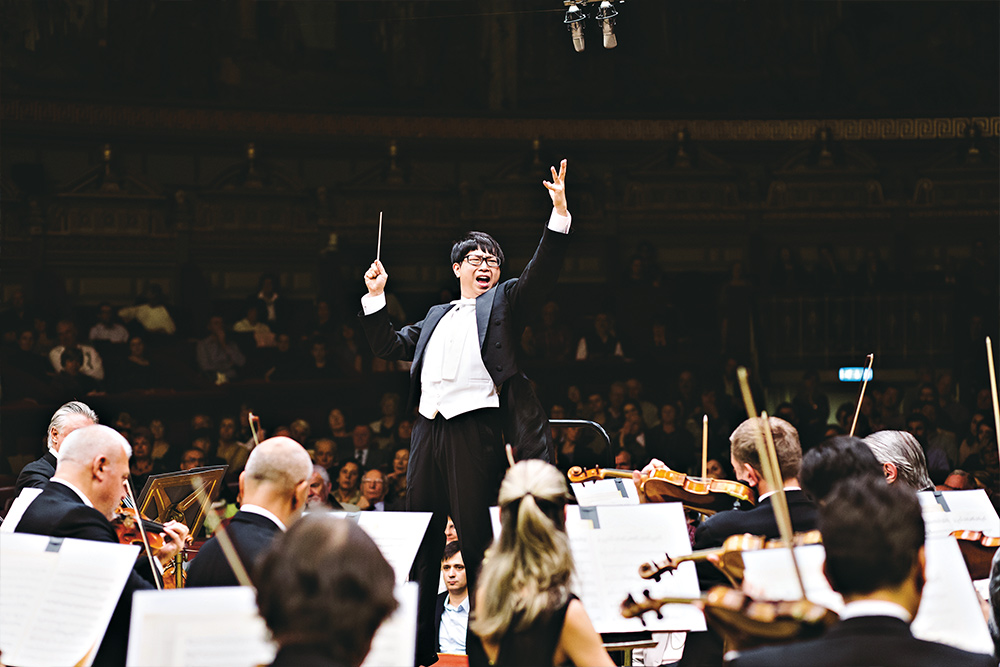All The World’s His Stage
Mr Kahchun Wong (Music ’11) tells us how hard work and a nurturing school environment let him morph from an NUS undergrad to a globally-acclaimed maestro.
 Mr Wong is also the recipient of prestigious awards. These include the Order of Merit, which was awarded last year by the Federal President of Germany for his contributions to Singaporean-German cultural relations and the advancement of German music culture overseas. He is the youngest and first Singaporean artist to receive it. Last year, Mr Wong was also one of the recipients of the Singapore Youth Award, the nation’s highest accolade for youths.
Mr Wong is also the recipient of prestigious awards. These include the Order of Merit, which was awarded last year by the Federal President of Germany for his contributions to Singaporean-German cultural relations and the advancement of German music culture overseas. He is the youngest and first Singaporean artist to receive it. Last year, Mr Wong was also one of the recipients of the Singapore Youth Award, the nation’s highest accolade for youths.
WHO IS HE?
As chief conductor of the world-famous Nuremberg Symphony Orchestra, Mr Kahchun Wong is one of the youngest Asians in such a role. The winner of the 2016 Mahler International Conducting Competition, and 2017 Young Artist Award by the National Arts Council, he is also the youngest ever to conduct the New York Philharmonic, the oldest major symphony orchestra in the US.
Ask Mr Kahchun Wong what he recalls about his four years at NUS and he will tell you that he wishes “[he] could return to those carefree, simple and uncomplicated days”. The Yong Siew Toh Conservatory of Music (YSTCM) undergraduate programme alumnus remembers attending concerts, catching the last bus back to the Prince George’s Park residence and snacking on “reliable waffles” at campus café Supersnacks. He also studied German at the Faculty of Arts and Social Sciences, something that has since helped him a lot in his career. After all, in 2017, Mr Wong became the chief conductor of the world-famous Nuremberg Symphony Orchestra at the mere age of 31. This made him one of the few Asian faces to lead a top-tier orchestra on the Western classical music scene — and also one of the youngest. Mr Wong also enjoys the accolade of being the youngest-ever to conduct the New York Philharmonic, the oldest major symphony orchestra in the US.
Now 33, he travels often across the US, the UK and Europe for work which has him playing to audiences of 1,000 to 65,000 people at venues that include the Klassik Open Air in Germany, Europe’s largest outdoor classical music concert. It is a far cry from the world of his growing-up years. As a child from a heartland estate, Mr Wong — who is now managed by Columbia Artists Management — probably didn’t imagine he would one day stand on the world stage, literally. Born to non-musician parents — his father was a warrant officer in the army and his mother was a childcare teacher — he picked up his first musical instrument, a cornet, when he joined the school band in primary school. It quickly resonated with him. “Sometime in Primary Six, I decided to be a musician. My journey through secondary school and junior college continued to support that dream and it was inevitable that I would study music in university,” he says.
Thankfully, his parents supported his decision, something that he is grateful for until today. He had two options back then: audition in Europe, which would require a bank loan, or study at NUS on a full scholarship. “The decision was easy to make. I came out a complete artist because of the world-class education I received at YSTCM.”
 Left: Mr Wong (in black) composing lyrics with Member of Parliament Mr Henry Kwek, storyteller Ms Rosemarie Somaiah, and songwriter Falling Feathers for Project Infinitude.
Left: Mr Wong (in black) composing lyrics with Member of Parliament Mr Henry Kwek, storyteller Ms Rosemarie Somaiah, and songwriter Falling Feathers for Project Infinitude.
A NURTURING SPACE
Mr Wong shares that just like undergraduates in other disciplines, a student at YSTCM would have a number of group lectures to attend. But the most important lesson of the week would be the principal study class. This was a one-on-one session with each student’s major teacher and while it took one hour, it would require about 20 hours of prep work throughout the week. Preparation would mean practising on their chosen instruments or, in Mr Wong’s case, composing music in his hostel room.
He also lets on that all YSTCM undergraduates were offered a single hostel room at Prince George’s Park, something that he appreciated because it meant saving three hours of commuting time to and from his home in Jurong. He also enjoyed learning to live independently, which comes in useful now that he travels often for work. Also, because there weren’t hostel activities at Prince George’s Park, he could focus on his studies. A typical day would start at 7.30am, with concerts to attend either in school or at the Esplanade, and end late into the night, when he would try to catch the last campus bus back to his hall. “My days at NUS provided me with a routine on how to condition myself physically and mentally for my profession. YSTCM was an essential part of my musical journey. It gave me a safe space with world-class software and hardware and equipped me with the right tools to leave the nest and rub shoulders with the best in my field.” This was thanks to the many concerts and masterclasses that his school put together. Also, guest conductors and soloists in town to perform with the Singapore Symphony Orchestra would visit the conservatory. And in addition to the hectic weekday line-up, there would be overseas competitions and auditions.
Mr Wong is also thankful for having found a mentor figure in Professor Bernard Lanskey, the dean at YSTCM. In the first week of orientation, he wrote a letter to the latter to ask for advice as he had wanted to study conducting, which isn’t offered at the undergraduate level. “It was the beginning of a very long nurturing relationship, of him always setting aside precious time to speak with me, and inspiring me to explore music.”
Passing on his passion

In 2016, Mr Wong co-founded Project Infinitude, a grassroots project, with Ms Marina Mahler, granddaughter of the famous Austrian composer Gustav Mahler. With this, Mr Wong hopes to pass on his love of music and knowledge to the next generation as he believes that music inculcates cognitive and psychological life skills in children. He works with non-profit agency Child at Street 11 in Singapore, where children below 12 and from all walks of life attend Singapore Symphony Orchestra concerts, ask him questions about musical instruments over lunch, watch videos on music and participate in creative processes like recording the sounds of falling rain at the Singapore Botanic Gardens. This year, the children will be joining the chorus at a performance that Mr Wong is preparing for at the Esplanade Concert Hall which will see musicians from ASEAN and the European Union coming together to perform.
Inspiring through action
While Mr Wong could have done his studies overseas, he says YSTCM allowed him to bide his time “quietly in a corner of the world”. As a result, he was able to remain “undistracted and totally focused” in a supportive environment. He shares that like athletes, it is important for musicians like himself to devote their entire time, even on their off days, to practising and honing their craft.
Even now, Mr Wong — whose advice to young musicians is to work much harder than others — wakes up a little after 4am almost every day. He takes the time to prepare scores for rehearsals, answer emails, make work calls and study music. In fact, he may sometimes take hundreds of hours to research music, after which he has to rehearse for three to four hours a day, over one to three days, before a performance.
And in spite of his busy days in school, Mr Wong found time to compose with and conduct the Singapore Chinese Orchestra as part of a collaboration with the YSTCM Composition Studio. He also started YSTCM Sinfonia in 2008 to give first-year students the opportunity to perform in an orchestral setting. It has now become an annual event held during orientation for freshmen to get to know one another by playing music together.
In spite of his career milestones, Mr Wong sees music as something more. He believes that it can inspire imagination and enrich lives. “When we listen to something incredibly tender and beautiful, we think of a newborn baby… or that moment years ago when someone close passed away. It provides emotional catharsis, allowing us to experience honest and intense feelings that we may not be able to express ourselves.”
Text by Pearlyn Tham. Main Photo by Cezar Buliga